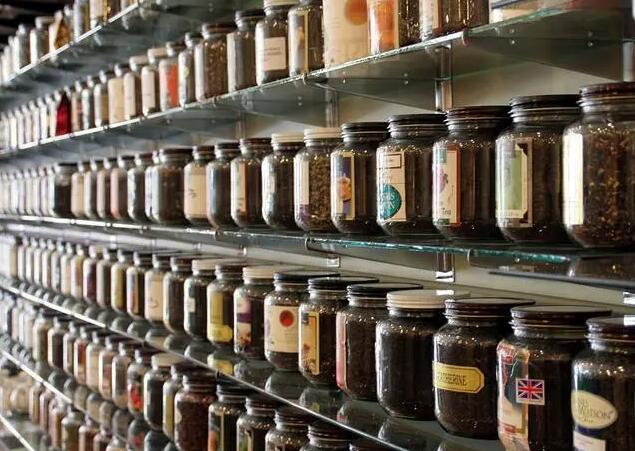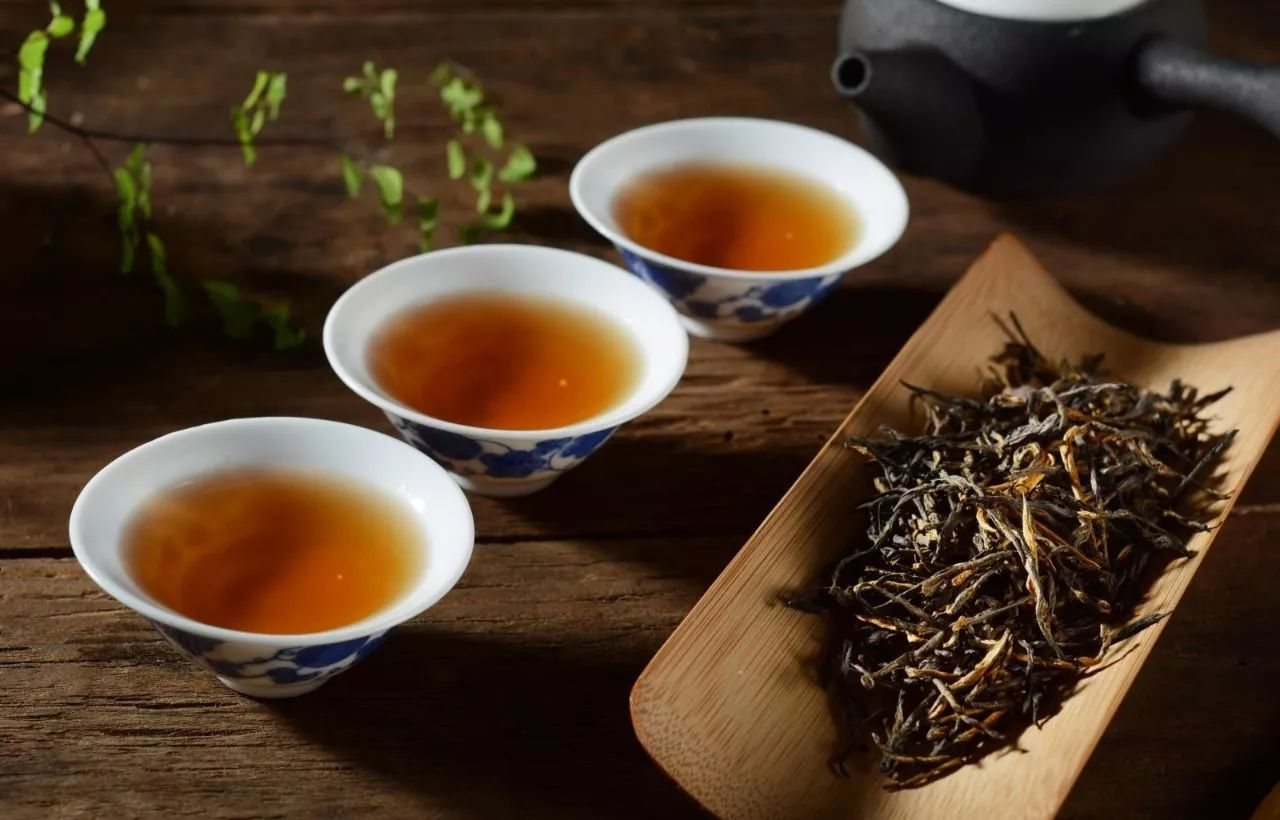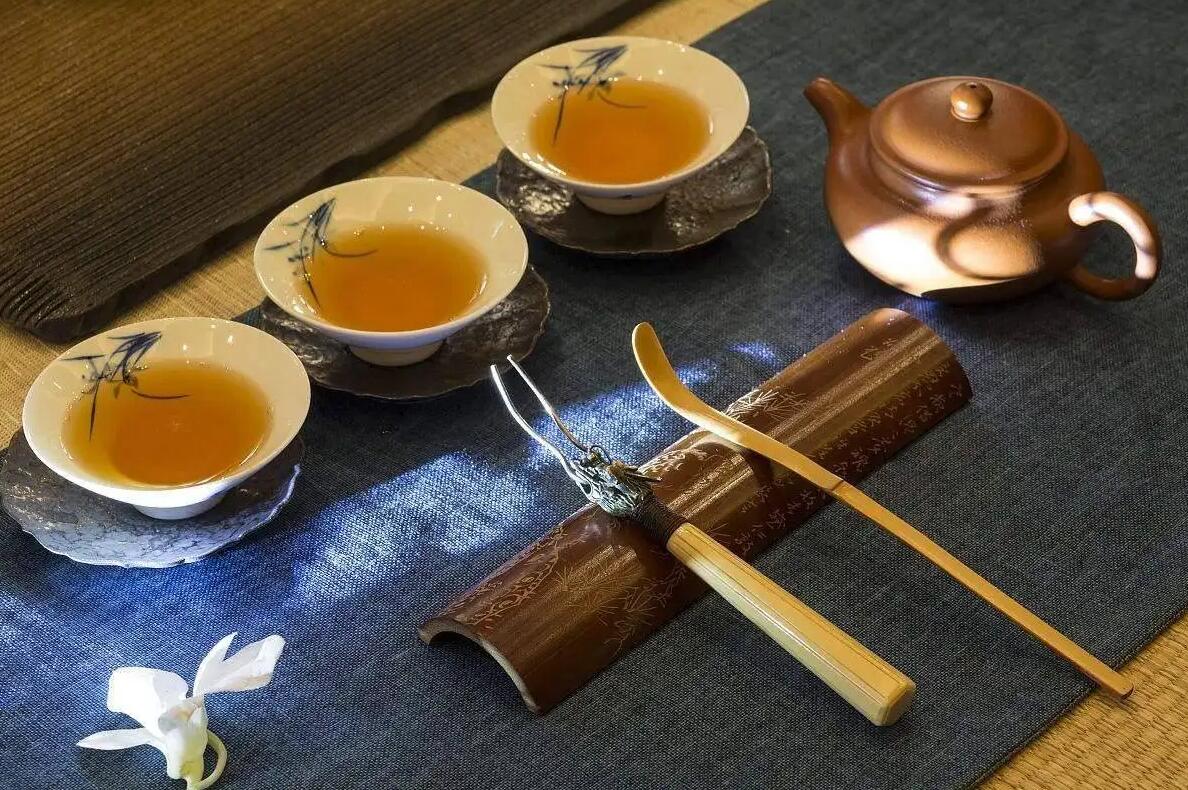Confucianism is the main stream culture of Chinese society, of which its core is made up of the Four Books and the Five Classics. The Four Books refer to The Knowledge, The Analects, The Middle Way, and the Meng Zi. The Five Classics refers to The Poems, The State Documents, The Courtesy, The Changes and The History. The relationship between the Chinese Tea Ceremony and Confucianism is that Confucianism is the philosophical source and the promoting part of the Chinese Tea Ceremony, and the Chinese Tea Ceremony is an amusing description of the lifestyles of the Confucian. This chapter focuses on the pursuit of humanity as a disciplined and moral action, a positive social attitude to life, a lofty emotion of benevolence and amiability towards others.
The Pursuit of Humanity as a Disciplined and Moral Action
Lu Yu mentioned about the "virtuous action' in the Classic of Tea He was greatly inspired by the education from a Confucian Li Gong when Lu Yu was young and cared at his home. He was also introduced by Li Qiwu to follow Zou Fuzi in his studies. This period of study provided him with a good basic knowledge that led to become the philosophical principles of the foundation of the Tea Ceremony.
"Speak Faithfully, Behave Respectfully"
A student asked Confucius what should be the standards of human behavior? He answered "Speak faithfully; Behave respectively", which means people should be honest in both their words and actions.
"Sagacious, Yan Hui is"
There is a talk between Confucius and his student Yan Hui in The Analects that he said "Sagacious, Yan Hui is. With a bowl of food and a bowl of water, living in a poor area, people worried about the quality of his life, but he would not change his own enjoyment. What a virtuous Hui is!" It is rare for Confucius to praise someone, but Yan Hui had been praised twice, which proved him to be a good example of virtue.
Lu Yu rephrased the thought that "disciplined and moral action" from the Confucianist ideas of "bright (be) the morality", to "speak faithful and "act respectively", which revealed the Chinese peopled spiritual pursuit.
A Positive Social Attitude to Life
The Confucian philosophy is a positive and persuading theory that makes people wish to improve or involve in the management of the society, hence this has been greatly promoted by rulers. It was even said that half of the contents in the Analects could be enough to rule the society well, which indicates that the contents of the book is mainly about the ideas and opinions on personality and social governing. The whole book was collected and edited by Confucius’s students which interpreted the relationship between self improvement and society administration.
About how to get involved in the society management, Confucius thought "when there is an opportunity, then try your best to devote to the society. When you could not manage to make the rulers listen to you, then you should go and improve yourself". This became a principle for the Confucian later.
Confucius himself was a sample of being positive to get involved in social management. He traveled to 14 different states to promote his thoughts to the rulers by the end of which he did not even notice that he became old.
It was recorded in King Zhuang. Arguing with the Kings that Confucius and his students were trapped between the border of the State of Chen and the State of Cai, without meal for seven days. They were so exhausted that they had to have wild vegetables. But Confucius was still singing in the room, whilst Yan was collecting wild vegetables.
Zi Lu talked with Zi Gong that "Our teacher has been banished twice from State Lu, forbidden to stay in the State of Wei, humiliated and punished to cut down wood, now trapped there and a lot of people wanted to kill him, but under this situation, how could he still have the heart to sing and play music? Doesn’t he fed any shame as a gentleman? "
Yan Hui did not say anything when he heard this but just went to Confucius and told him. Confucius stopped playing and said They couldn't, see that far, ask them t o come in and I shall talk to them."
hen they came in, Zi Lu said "Are we now having nowhere to go?”
Confucius said "You shouldn’t say this. To us, when you have nowhere, or there is no way to realize your dream or have no place to go to presently. It doesn't truly mean that you are of no use to the society. At present, this country is suffering so much from disorder, but we are holding the methods and ideas to re-adjust society with virtue. How could you say that we have nowhere to go? You could only know how noble a pine tree is when it snows heavily. Today to me is just a lucky thing."
Confucius went back to play the music and Zi Lu started to follow and dance. Zi Gong then said "I was so shallow that I didn't truely understand our master."
Confucius set a good example by his own conduct of the importance to be courageous and held a positive attitude toward things.
A Lofty Emotion of Benevolence and Amiability towards Others
The Confucians admire "virtue" and "courtesy", promote "loyalty" and the "middle way", which profoundly affected the Chinese Tea Ceremony. "Virtue" is the most affective thought that contains mainly "Kind, humanity is; (and) family love is the basics" and then "Family love leads to benevolence, and benevolence leads to amiability towards others".
"Kind, Humanity is; Family Love are the Basics"
In the Spring and Autumn Period, when the King of the State of Lu enquired about the way to manage the country with Confucius, Confucius answered that it is people that make the policies, and only virtuous people should be selected, but what is the standard of virtuous people? Kind, humanity is; family love are the basics. "which can be interpreted that, to judge a people's virtue, we should first have a look to see if he is kind to his family.
The thoughts of "Kind, humanity is; family love are the basics" have been used frequently.
Wang Yucheng, a scholar in the Song Dynasty, wrote a poem about the Dragon and Phoenix Tea as follows:
It is titled Dragon and Phoenix Tea, given because I am able to be close to the King.
Expecting the Shangling Hill or Jianxi River to brew tea would be impossible.
The aroma is just liKe the. fragrant flowers and its shape looks tike the round moon serve it to parents.
Tea "Dragon phoenix Tea" is really expensive and precious, Ouyang Xiu has described that the most precious tea is probably the Dragon and Phoenix Tea, which is named 'Round Tea'. It is so subtle that we call it Little round', every twenty of them weighs half kilogram and was worth 100 grams of gold, it is easy to get gold but not as the little round. Four of us could only share one when being given the largess, it usually being decorated with gold flowers" In the Song Dynasty only high officials, like a General or a Prime Minister, could have the opportunity to be given the largess from the Emperor. When Wang Yucheng was given this, he served it to his parents, which revealed marvelous virtue to family.
Bai Juyi enjoyed looking at springs and waters when he was the Governor of Hangzhou. He had written a poem just after he found a new spring.
Sitting and boiling the Ling-Ling Water, watching the se-se dust brewing. Daring not to drink a bowl, but to serve it to the people who love it
"Ling-ling water" means clear and good water whilst "se-se dust" means green tea powders. "Wu you" means no reason. Bai Juyi always thought of his friends after finding a new spring unconsciously, which is called "family love first" between friends.
After receiving a poem and some Mengshan Tea from his brother Su shi as gifts, Su zhe offered his thanks in a poem, "your poem is rich of thoughts but the people responded just as few as the shadows of painting. Missing makes the poem in heart moving in the evening, being drunk and thinking of you (and hoe we) were there apart. Just knew that you got Meng Mountain tea that I would like to bring to the Shu Mountain spring." This shows the "family love first" between brothers.
Lu Yu, Sage of Tea, had an example of "kind, humanity is; family love is the basics". His girlfriend Li Ye was ill in her old age, and Lu Yu always went to see her when she needed him. This was proved in her poem as foLLows:
Being Ill in a Boat but Happy when Lu Yu's Visiting
It was a frosty under the moonlight but now it is foggy.I am still ill when we meet, tears coming out before I talk.
Drinking Tao Yuanming's wine and reading Xie Lingyun's poems. Being drunk occasionally like this and I ask for nothing else.
Lu Yu, action convinced people that he behaved the "kind, huamanity is; family love are the basics" as well.
"Kind, humanity is; family love are the basics" is the basic performance of the in the Chinese tea ceremony.
Family Love Leads to Benevolence; Benevolence Leads to Amiability towards Others
Meng Zi developed Confucius's "kind, humanity is; family love are the basics" thought and proposed that "Family love leads to benevolence; benevolence leads to amiability towards others", by which people should broaden their loves to others in the society and everything, not just their family. This is a sublimation of benevolence.
The thought "benevolence leads to amiability towards others" of Confucianism has the same meaning with the Buddhism thought "great mercy needs no reason, and great benevolence shares the same quality" and the Taoism thought "probably everything was just one thing" This requires people love nature and others by heart, which could be seen from Su Shi's poem Begonia as follows:
The East wind breezes past upon the surface of the lake, the moon hiding behind the fog. Worrying that the flowers will fall asleep when deep at night, holding up the candle to provide light.
In an evening, Su Shi worried that the flower would feel lonely as the candles were lit and accompanying the begonia flower. His sympathy to the flowers is tender and soft, which is an example of the thought of benevolence in life.



